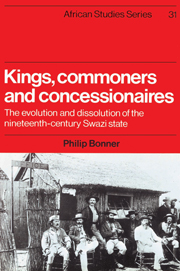 Kings, Commoners and Concessionaires
Kings, Commoners and Concessionaires Book contents
- Frontmatter
- Contents
- List of maps
- List of figures
- Preface
- Map 1 Modern Swaziland
- Map 2 Chiefdoms c. 1820
- 1 Introduction
- 2 The northern Nguni states 1700–1815
- 3 The conquest state 1820–1838
- 4 Factions and fissions: Mswati's early years
- 5 The balance tilts: Swazi–Boer relations 1852–1865
- 6 The deepening and widening of Dlamini power 1852–1865
- 7 Regency and retreat 1865–1874
- 8 Confederation, containment and conciliar rule: Mbandzeni's apprenticeship 1874–1881
- 9 The puff–adder stirs: Mbandzeni and the beginnings of concessions 1881–1886
- 10 The conquest by concessions 1886–1889
- 11 Conclusion
- Appendix
- Notes
- Bibliography
- Index
- KINGS, COMMONERS AND CONCESSIONAIRES
6 - The deepening and widening of Dlamini power 1852–1865
Published online by Cambridge University Press: 22 September 2009
- Frontmatter
- Contents
- List of maps
- List of figures
- Preface
- Map 1 Modern Swaziland
- Map 2 Chiefdoms c. 1820
- 1 Introduction
- 2 The northern Nguni states 1700–1815
- 3 The conquest state 1820–1838
- 4 Factions and fissions: Mswati's early years
- 5 The balance tilts: Swazi–Boer relations 1852–1865
- 6 The deepening and widening of Dlamini power 1852–1865
- 7 Regency and retreat 1865–1874
- 8 Confederation, containment and conciliar rule: Mbandzeni's apprenticeship 1874–1881
- 9 The puff–adder stirs: Mbandzeni and the beginnings of concessions 1881–1886
- 10 The conquest by concessions 1886–1889
- 11 Conclusion
- Appendix
- Notes
- Bibliography
- Index
- KINGS, COMMONERS AND CONCESSIONAIRES
Summary
The final years of Mswati's reign had as far-reaching repercussions internally as they did in foreign affairs. Externally, Mswati used his freedom from challenge to restructure relations with neighbouring powers. Within Swaziland, he took advantage of the same lull to consolidate his domestic administration, without having to worry about creating a potential fifth column which might ally itself with enemies abroad. The precise nature of these changes, the circumstances which brought them about, and the way in which they impinged on Swaziland's relations with the Zulu, the Portuguese and the Shangane are the subject of the present chapter.
For Mswati, 1852 was a year of almost unrelieved disaster. Under the impact of invasion and foreign occupation, large numbers of Swazi had fled to neighbouring states, and one can only presume that this was just the visible tip of a much larger submerged group, whose loyalty wavered during the crisis. Once the Zulu armies had departed, Mswati took steps to weed out the waverers and to eradicate the conditions which had brought him so near to collapse. The strategy he adopted fell into two distinct parts, each of which had been tentatively developed even before the attack. Some time after the Zulu invasion of 1847, Mswati had evacuated his capital from Ekufiyeni in central Swaziland to Hhohho, which had meant shifting the main locus of royal power considerably further to the north, and after the occupation of 1852 Mswati greatly accelerated this process, by allocating numerous chiefdoms in the area to his brothers and his wives.
- Type
- Chapter
- Information
- Kings, Commoners and ConcessionairesThe Evolution and Dissolution of the Nineteenth-Century Swazi State, pp. 85 - 102Publisher: Cambridge University PressPrint publication year: 1983


